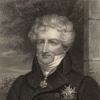Georges Cuvier

Georges Cuvier
Jean Léopold Nicolas Frédéric Cuvier, known as Georges Cuvier, was a French naturalist and zoologist, sometimes referred to as the "father of paleontology". Cuvier was a major figure in natural sciences research in the early 19th century and was instrumental in establishing the fields of comparative anatomy and paleontology through his work in comparing living animals with fossils...
NationalityFrench
ProfessionScientist
Date of Birth23 August 1769
CountryFrance
great limited older small subject uniform variation within
The older the layers, the more each of them is uniform over a great extent; the newer the layers, the more they are limited and subject to variation within small distances.
body earth fossils
It is to them [fossils] alone that we owe the commencement of even a Theory of the Earth ... By them we are enabled to ascertain, with the utmost certainty, that our earth has not always been covered over by the same external crust, because we are thoroughly assured that the organized bodies to which these fossil remains belong must have lived upon the surface before they came to be buried, as they now are, at a great depth.
art honor ornithology
[Audubon's works are] the most splendid monuments which art has erected in honor of ornithology.
men darkness revolution
If they [enlightened men] take any interest in examining, in the infancy of our species, the almost obliterated traces of so many nations that have become extinct, they will doubtless take a similar interest in collecting, amidst the darkness which covers the infancy of the globe, the traces of those revolutions which took place anterior to the existence of all nations.
animal people three
Moreover, it thus follows that not a great deal of time was needed for the large animals of the three major parts of the world to become known to the people who spent time on the coasts of those regions.
sea land levels
The lowest and most level land areas show us, especially when we dig there to very great depths, nothing but horizontal layers of material more or less varied, which almost all contain innumerable products of the sea.
discovery blood nurse
Nurse, it was I who discovered that leeches have red blood.[]On his deathbed when the nurse came to apply leeches
mean passion past
It has been long considered possible to explain the more ancient revolutions on... the Earth surface by means of these still existing causes; in the same manner as it is found easy to explain past events in political history, by an acquaintance with the passions and intrigues of the present day. But we shall presently see that unfortunately this is not the case in physical history:-the thread of operation is here broken, the march of nature is changed, and none of the agents that she now employs were sufficient for the production of her ancient works.
animal land earth
My object will be, first, to show by what connections the history of the fossil bones of land animals is linked to the theory of the earth and why they have a particular importance in this respect.
sea upset earth
But the revolutions and changes which are responsible for the present state of the earth are not limited to the upsetting of the ancient strata and to the ebbing of the sea after the formations of new layers.
moving feet mountain-ranges
The traces of upheavals become more impressive when one moves a little higher, when one gets even closer to the foot of the great mountain ranges. There are still plenty of shell layers. We notice them, even thicker and more solid ones.
strong animal men
In spite of what moralists say, the, animals are scarcely less wicked or less unhappy than we are ourselves. The arrogance of the strong, the servility of the weak, low rapacity, ephemeral pleasure purchased by great effort, death preceded by long suffering, all belong to the animals as they do to men.
taken eye sight
At the sight of a single bone, of a single piece of bone, I recognize and reconstruct the portion of the whole from which it would have been taken. The whole being to which this fragment belonged appears in my mind's eye.
passion men civilization
To spread healthy ideas among even the lowest classes of people, to remove men from the influence of prejudice and passion, to make reason the arbiter and supreme guide of public opinion; that is the essential goal of the sciences; that is how science will contribute to the advancement of civilization, and that is what deserves protection of governments who want to insure the stability of their power.